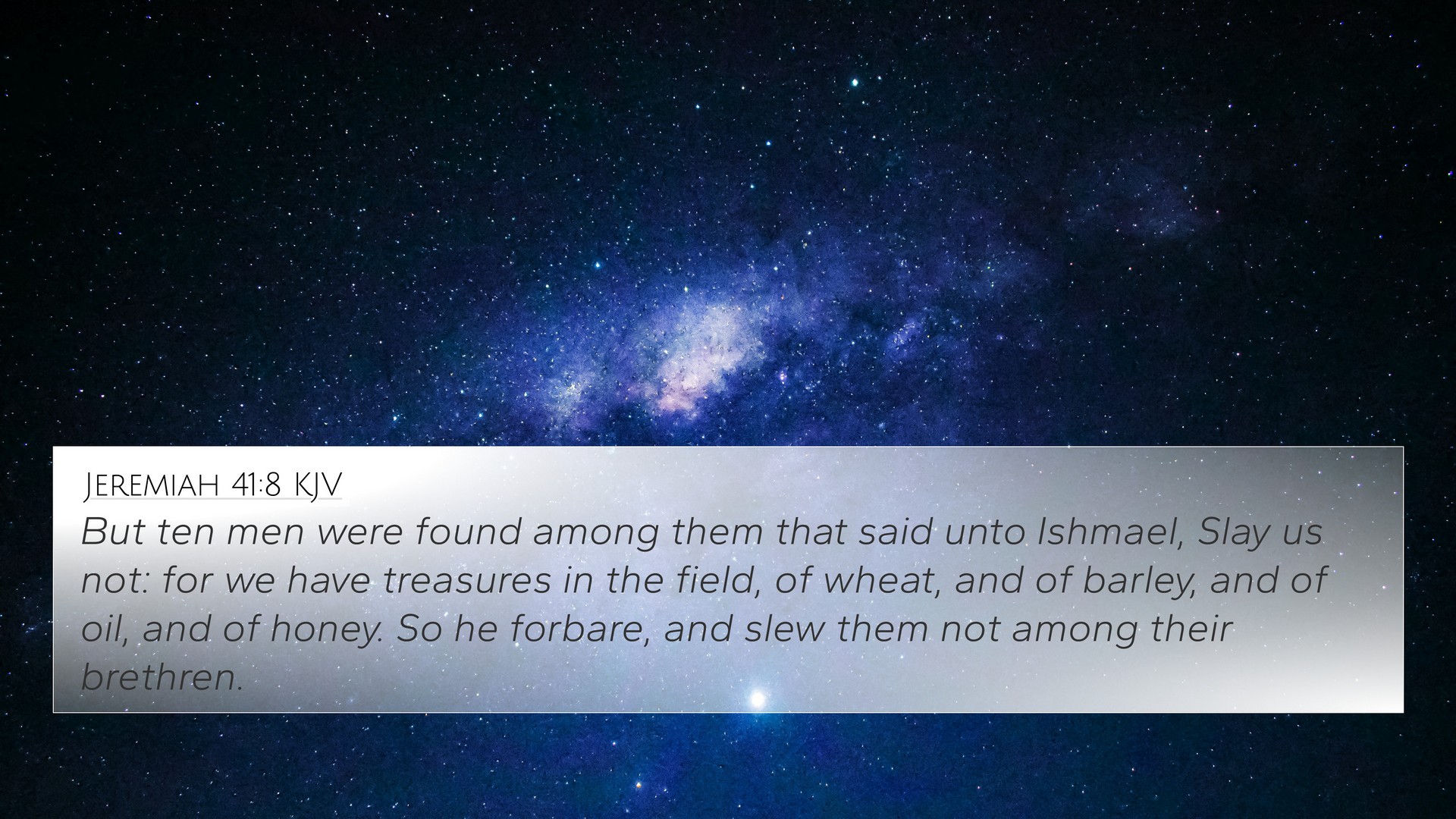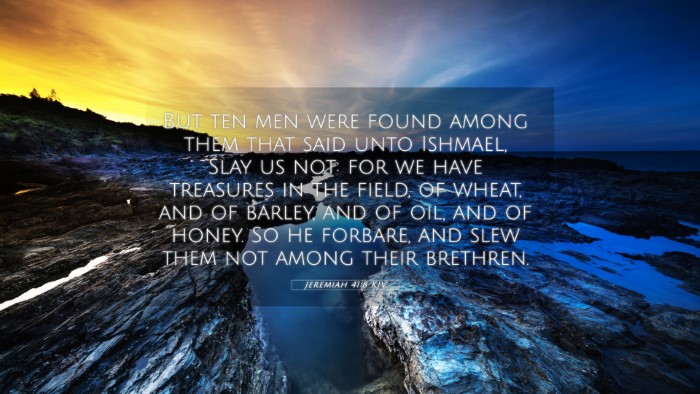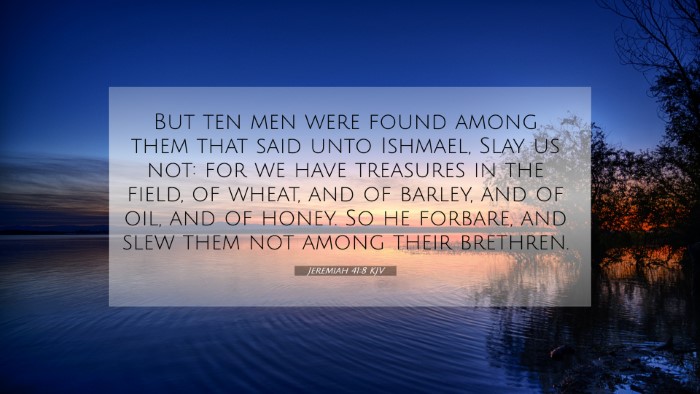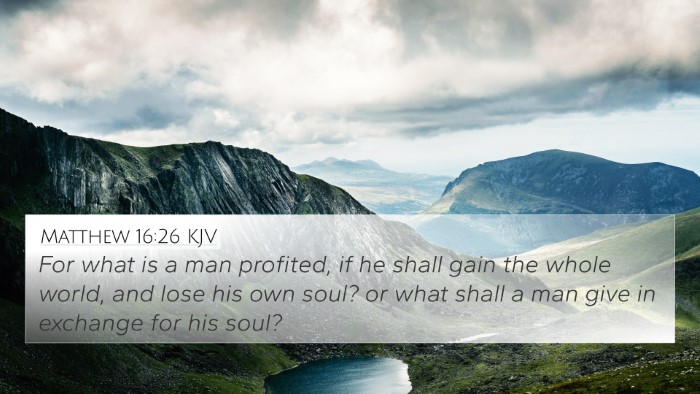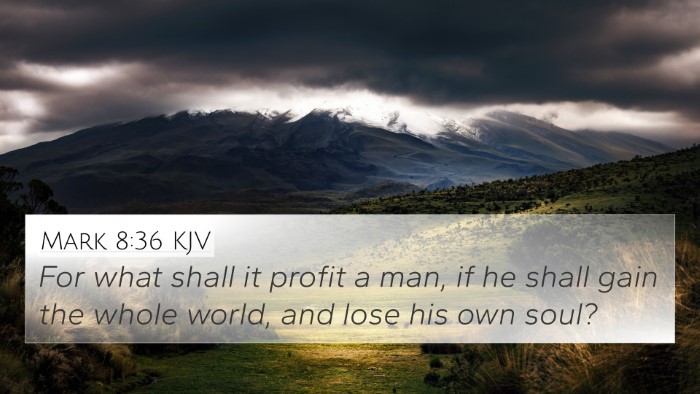Understanding Jeremiah 41:8
Jeremiah 41:8 states:
"But ten men were found among them that said unto Ishmael, 'Do not kill us: for we have treasures in the field, of wheat, and of barley, and of oil, and of honey.' So he forbare, and did not slay them among their brethren."
Summarized Meaning
This verse presents a critical moment in the narrative of Jeremiah, focusing on Ishmael's attempt to eradicate those left in Jerusalem after the Babylonian exile. The plea of the ten men reflects both desperation and cunning, as they use the mention of treasures to bargain for their lives.
Insights from Public Domain Commentaries
-
Matthew Henry:
Henry emphasizes the moral decline of the people and Ishmael's ruthless character. He posits that the distress and fear of the people reveal a deeper spiritual emptiness. The treasures mentioned can be seen as material dependencies and the instincts of self-preservation overpowering divine moral law.
-
Albert Barnes:
Barnes notes the historical context of this event as crucial to understanding the leadership crisis in post-exilic Judah. By highlighting the treasures, the men signal the importance of material security over spiritual fidelity. Barnes interprets this as illustrative of how fear can dictate human responses, drawing a parallel to other biblical accounts of survival.
-
Adam Clarke:
Clarke provides insight into the psychological dimensions of the verse, suggesting that the ten men could be viewed as symbols of hope amidst despair. Their appeal ties into a broader theme of redemption, as not all would succumb to Ishmael's brutality, reinforcing the notion of divine protection and mercy even in dire circumstances.
Cross References
This verse connects with several other biblical texts that reflect similar themes of survival, desperation, and relationships in crises:
- Jeremiah 39:6-7: The fate of Zedekiah and the downfall of Jerusalem serve as a backdrop to the vulnerabilities faced by those remaining.
- Jeremiah 40:14: The historical conflict following the Babylonian captivity illustrates the precarious political landscape.
- 2 Kings 25:7: The grim end for Jerusalem's king emphasizes the consequences of disloyalty and rebellion against God.
- Matthew 10:28: Here, the value of the soul transcends physical existence, touching on themes of fear and faith.
- Proverbs 11:4: Wealth offers no real advantage in times of God's judgment, reinforcing the need for spiritual fidelity over material possessions.
- Psalm 49:7-8: Reflects on the futility of riches in the face of death, resonating with the desperation displayed by the men appealing to Ishmael.
- James 4:13-14: Teaches about the uncertainty of life, parallel to the imminent threat the men face.
- Luke 12:15: A warning against coveting possessions, with a call to prioritize true riches in God.
- Romans 8:31: A reassurance of God’s protection in the face of danger and despair, which aligns with the mercy depicted in this verse.
- Exodus 1:16: Highlights the theme of oppression and survival under tyrannical rulers, connecting past and present struggles for life.
Thematic Connections
This verse exemplifies a critical lesson in the Bible regarding the relative value of material wealth and divine protection. In times of peril, the reliance on tangible resources often conflicts with spiritual truth and the need for one's faith. Understanding Jeremiah 41:8 requires a holistic approach, noticing how it interconnects with various texts.
Cross-Referencing in Bible Study
To fully grasp the implications of Jeremiah 41:8, utilizing Bible cross-reference tools and methods would be beneficial. This includes:
- Bible Concordance: Identifying key terms and themes.
- Bible Reference Resources: Reading commentaries and analyses from trusted sources.
- Chain References: Following thematic threads through scripture for deeper understanding.
- Guides on Bible Cross-Referencing: Techniques for linking scriptures for enhanced study.
Conclusion
In summary, Jeremiah 41:8 serves as a poignant reminder of the fragility of human life and the enduring importance of faith amid adversity. By exploring cross-references and related scriptures, believers can enrich their understanding of this passage and interrogate the connections that tie the entirety of scripture together within the broader narrative of God's dealings with humanity.
